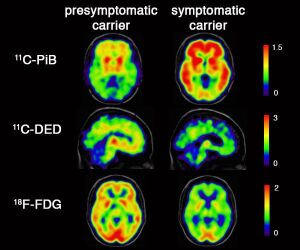by
Thomas Dworetzky, Contributing Reporter | January 29, 2016

PET- brain images illustrating
the researcher's findings.
Credit: Agneta Nordberg et al./Brain.
Swedish researchers have found that inflammatory changes in the brain can be spotted almost two decades before an Alzheimer's patient shows their first symptoms. This could potentially provide a window for patients to make lifestyle changes to prepare for its onset, or for early prophylactic or modifying treatment to slow down or stop the progress of the disease, when such therapies eventually become available.
"This study increases our understanding of the early stages of Alzheimer's disease," Agneta Nordberg, a professor at Karolinska and co-author of the study, published in
Brain,
told daily newspaper Dagens Nyheter.
"There has been a huge focus on amyloids in Alzheimer's research, but it has not been so successful in treatment trials, perhaps because most studies have been conducted in patients with already pronounced symptoms. This discovery shows that there are other components that are important enough to explore," she noted.



Ad Statistics
Times Displayed: 2839
Times Visited: 27 Fast-moving cardiac structures have a big impact on imaging. Fujifilm’s SCENARIA View premium performance CT brings solutions to address motion in Coronary CTA while delivering unique dose saving and workflow increasing benefits.
The team looked at members of families with four different known Alzheimer’s mutations and a group of patients with non-inherited, "sporadic" Alzheimer’s disease. Memory tests and PET scans were used. Tracer molecules PIB, Deprenyl and FDG were employed to determine amyloid plaque levels and inflammatory changes, specifically astrocyte activation. The scans were repeated on half of the nearly 50 individuals in the study after three years to check for changes.
“Inflammatory changes in the form of higher levels of brain astrocytes are thought to be a very early indicator of disease onset,” noted Nordberg, a professor at the Department of Neurobiology, Care Sciences and Society, Center for Alzheimer Research at Karolinska.
“Astrocyte activation peaks roughly twenty years before the expected symptoms and then goes into decline, in contrast to the accumulation of amyloid plaques, which increases constantly over time until clinical symptoms show. The accumulation of amyloid plaque and the increase in number of astrocytes therefore display opposing patterns along the timeline.”
The study suggests that targeting this early inflammation might even stop amyloid plaques from developing in the first place.
“As of today, no therapeutic strategy has succeeded at changing the course of the disease,” first author Dr. Elena Rodriguez-Vieitez
told The Telegraph.

